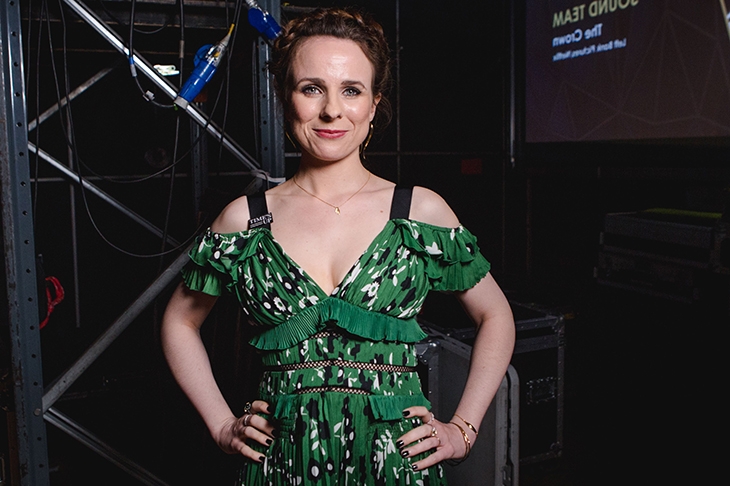Here’s a thought. Matthew Bannister, former Radio 1 controller turned presenter of programmes such as Outlook on the World Service and Radio 4’s The Last Word, has just announced that he’s leaving Outlook, which goes out several times a week, to ‘join the world of podcasting’. In fact, he’s already launched his own podcast, Folk on Foot. It’s as if he now believes that podcasting is where the exciting new challenges in audio (note, not broadcasting) can be found. We wireless-lovers should pay attention. Bannister is a radio man through and through. Does he really believe that podcasting is the future?
We’re still waiting for the podcast that truly challenges the best of conventional radio. (Serial took over the world but though well-made did not keep my attention till the end.) Podcasts have to be extra sharp, clever, pertinent, magical or inspiring if they want us to sign up and return for more episodes. And by podcasts I’m referring here to those programmes that are made specifically to be caught online and have no scheduled radio presence. Fortunately…, by Jane Garvey and Fi Glover (part of the BBC’s rapidly advancing stable of original podcasts), sometimes catches a mood, a thought that’s worth holding on to, but for the most part it’s just too conversational and not focused enough. I’d rather spend time with my friends talking over the dinner table.
Griefcast, Cariad Lloyd’s award-winning self-made podcast in which she talks to a guest, usually a fellow comedian, about their experiences of grief, does make that connection with the listener, but at over an hour it is too long and unstructured. Lloyd, who lost her father when she was 15, has an excellent mission: to get us all talking more about death. In the latest episode Robert Popper (creator of Channel 4’s Friday Night Dinner) remembers his grandmother, who escaped from the Nazis on the last train out of Stuttgart as war was declared in 1939. She hoped to get to America but ended up in London, where she lived until she was 92.
It’s good to talk, as they say, and especially about death and our need to grieve, which in the fast-paced lives we tend to live now is not given enough attention or space. It takes months to adjust back to normal life, and years to work out our feelings about a close relative once they’ve gone. There were touching moments as Popper recalled the eccentricities of his grandmother and what it must have been like for her to arrive in England with nothing and not knowing the language. We heard, too, about Lloyd’s grandfather who was imprisoned by the Japanese during the war. But I zoned out before they were done, in part I think because the informal style makes you feel less committed. There was no sense of an arc to the conversation, a narrative structure. Podcasters will argue that such formalities are manicured, not natural enough; but they’re essential if they want millions to stay tuned in.
Bannister’s Folk on Foot — a cross between Janice Long’s Radio 2 programme A Long Walk With… (but taken out of the city and into the countryside) and Clare Balding’s Radio 4 series Ramblings, with added music — is very listenable. He’s a genial host and knows how to talk to people after years of meeting guests from around the world for Outlook. The production (by Sally Spurring and Natalie Steed, who have both worked on Radio 4) is excellent, a beautiful, clear sound with no distracting undercurrents. The latest episode takes us into the woods after dark to listen to nightingales in the company of folk singer Sam Lee. It’s a link back to 1924 and the first outside broadcast on the wireless when a cellist played in her twilit garden accompanied by a nightingale. Is Bannister trying to tell us something?
Radio 4’s Across the Red Line is not a podcast but part of the Wednesday-night schedule. It has, though, some of the characteristics of podcasting in its casual overthrowing of some of the formality of being ‘in the studio’, and its premise that the guests are going on a personal journey. And yet it never fails to be clear, concise, thought-provoking in a good way (not controversial for the sake of it), and is never dull. Anne McElvoy brings two people with wildly opposing views together and tries to help them discover, with the aid of a conflict-resolution expert (Gabrielle Rifkind), some common ground. Last week’s episode took as its theme taxation and whether it’s a burden or a privilege. It was timely after recent revelations about seaside towns that are suffering because owners of second homes/holiday lets have found a way of avoiding council tax and business rates.
McElvoy asks her guests, Juliet Samuel and Kerry-Anne Mendoza, first to voice their opinion, then to tell us how they came to that opinion, and finally to express each other’s point of view in their own words. This was self-revelation with a purpose, to see why we think as we do and whether there is any room for manoeuvre. It led me to question my assumptions. Result.






Comments